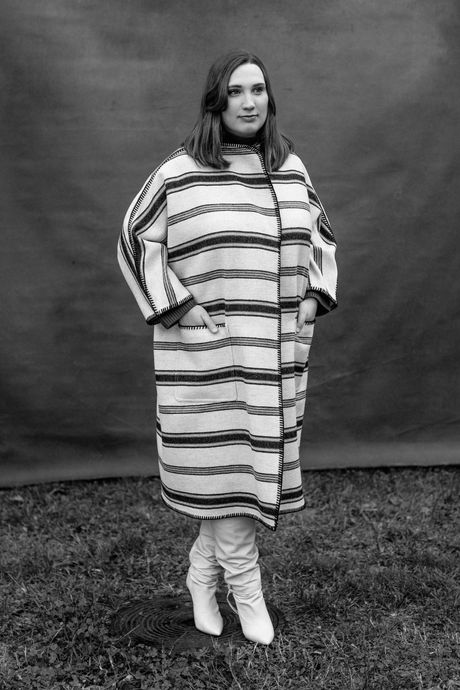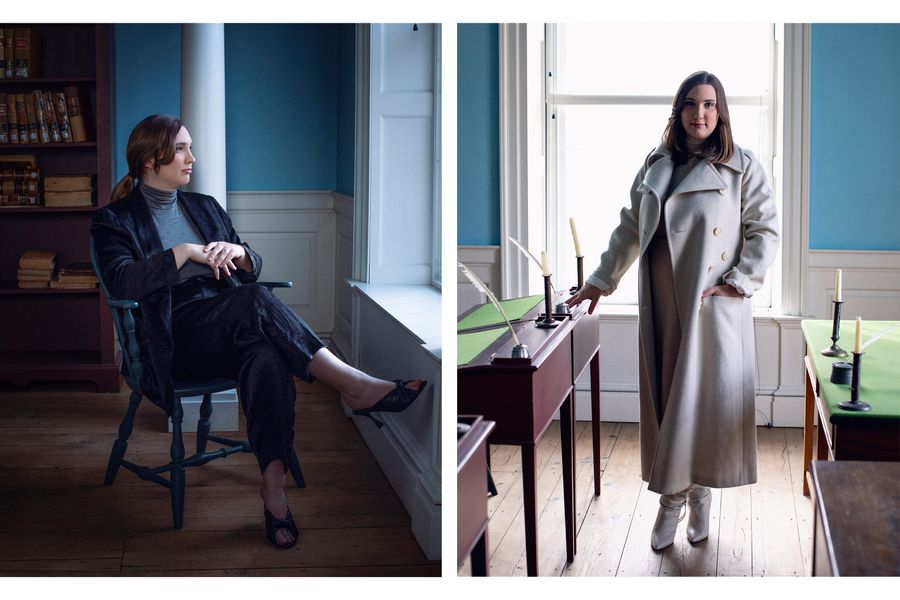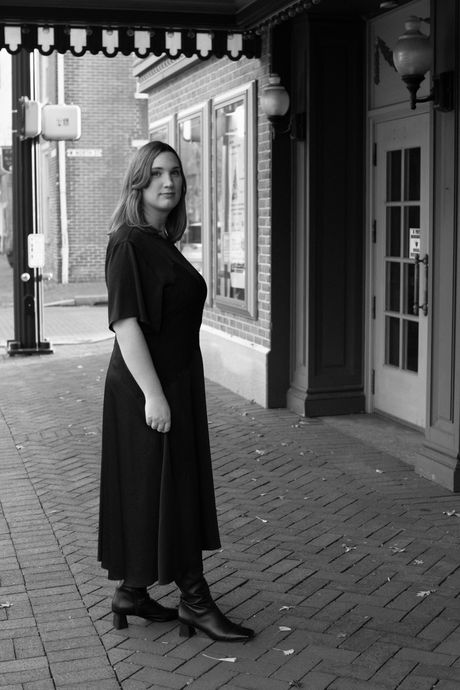
On the tree-lined, redbrick-residential streets of northwest Wilmington, Delaware, newly elected state senator Sarah McBride is high-school-cheer-captain-level popular. “Hello!” says a woman pushing a baby stroller. “Hello!” greets a man walking his dog. “Hello!” squeal a trio of children in the yard of a Catholic school. “Sarah!” exclaim two middle-aged women in a Christmas-wreathed, red-Adirondack-fronted coffee shop. “Congrats on the new house! How’s the renovation going?” McBride shoots back immediately to one, making a “Yellow Wallpaper” joke about the woman’s soon-to-be-removed actual yellow wallpaper.
It’s a brisk, sunny day in mid-December, and McBride, who was elected to represent Delaware’s First District in November, sealing her place as the highest-ranking openly transgender elected official in U.S. history, is living up to her high-school nickname: Tour Guide McBride. She waxes poetic about Delaware state history, “constituent services,” and how to pronounce the name of the city of Harrington like a true Delawarean. Dressed casually in loose jeans, tennis shoes, and a gray jacket with a stain on the furry white lapel, McBride has a charm that’s part corny grandfather (“I like a little coffee with my cream and sugar,” she says, winking) and part super-eager, super-nerdy Rachel Maddow. Her cheery chatter is often accompanied by snorty laughs.
“The thing that I love most about Delaware is that we are a small town but a state at the same time,” McBride had told me when we first spoke a week earlier. “I think that when you have that ‘state of neighbors,’ as I called it throughout this campaign, there’s just a deeper sense of home that you feel no matter where you go in this state.” At the time, it had struck me as unusual that a transgender politician would be so passionate about the small, homogeneous city (population 70,000) she grew up in presenting as straight and cisgender — after all, moving to a big city to escape small-town bigotry is a queer coming-out trope — but as we walk past well-manicured lawns, some still staked with McBride’s campaign signs, it seems obvious that she would want to settle down here. At only 30, she has already spent the majority of her life thinking about how to make life better for the people in her state.
Not only that, but that neighborliness she identified, that sense that her constituents really know her and she knows them, turns out to have been an important factor in her election — and a replicable model for queer politicians across the country.
“That white house is where Aubrey Plaza grew up,” McBride says with a smile, continuing her tour. “Delaware’s a small place.”
As a child, McBride thought a lot about the other White House. Not so much the people who lived there but the design of the building itself. Born to upper-middle-class progressive-minded parents, an attorney and an educational advocate, she loved playing with blocks and considering the structure of famous buildings. “I thought I might want to be an architect,” she says. “And one of the buildings I found to be beautiful was the White House.”
That interest led her to an obsession with history and politics before she was even a teenager. “I fell in love with government and saw that the story of our history is the story of an ever-expanding understanding of ‘We the People.’ That it’s the history of a deepening understanding of our humanity and a widening of justice and equity for more and more people,” she says — a line that sounds overheated on paper but like the impassioned monologue of a progressive history buff in person.
Luckily for her, Wilmington is the kind of city where the secretary of the state senate might live across the street. At 11 years old, she walked into a local pizzeria and met then-Senator Joe Biden, who gave her a signed copy of his schedule for the day that read, “Remember me when you are president.” By the time she was in middle school, at 14, McBride was participating in state politics as a volunteer for her father’s colleague who was running for insurance commissioner. On the campaign trail, she developed a relationship with both Beau Biden and Jack Markell, the soon-to-be governor of Delaware. She began regularly introducing Markell at campaign events. After his victory, Markell became a mentor, sometimes leaving McBride at the governor’s desk alone to help him finish his speeches. She was still in high school.
“From the first time that we met, I noticed a spark, a smile, an ability to bring people together,” the former governor recalls. “She was a great storyteller, a great orator, a strategic thinker.”
For college, McBride chose American University in Washington, D.C. In her junior year, after knocking on every single campus door, she was elected student-body president. It was then that she began to feel the pressure to come out, even if it meant jeopardizing her political dreams. Following a successful fight for gender-inclusive housing on campus, McBride was asked by someone about the inspiration for her effort — why did this straight boy in a fraternity care so much about LGBTQ+ issues? — and McBride felt her internal and external façades begin to crumble.
She confided first in a friend before telling her parents during the winter holiday break. Back on campus in 2012, she came out to the entire student body in an op-ed titled “The Real Me” in the school newspaper, The Eagle. “For my entire life, I’ve wrestled with my gender identity. It was only after the experiences of this year that I was able to come to terms with what had been my deepest secret: I’m transgender,” she wrote. “At an early age, I also developed my love of politics. I wrestled with the idea that my dream and my identity seemed mutually exclusive; I had to pick. So I picked what I thought was easier and wouldn’t disappoint people.”
Zooming from her parents’ house recently, McBride spins the camera around: “This is actually the spot where I came out to my mom,” she says with a giant smile. The experience hadn’t been exactly positive (her parents were accepting in the long run, though frightened for her safety and well-being at first), and she was sure it was the death knell of her political ambitions. But now, she sees the room as the catalyst for everything that was to come.
After coming out, McBride didn’t give up on politics. Instead, she interned at the Victory Fund and then became the first trans White House intern. When she recalls this time, it’s as if she’s recounting a fairy tale, if the princess’s deepest dream was to roam the corridors of power where history had been made. “I’d be in this room by myself, the space where Kennedy navigated the Cuban Missile Crisis, where Harry Truman was sworn in after the death of Franklin Roosevelt during the final months of WWII,” she says. “You think about the discussions that have happened around that table, that have impacted people on a scale that is almost incomprehensible. And you recognize that in those spaces, if it’s done right, if we have a cross section of people who are there for the right reasons, there’s an ability to bring about change and to make a difference that is unmatched in any place or in any way in society.” Of course, McBride was likely the first person like her in one of those rooms, dipping her toe into the water of history-making herself.
It was also in the halls of the White House that she fell in love with Andrew Cray, a handsome trans man who worked at the Center for American Progress on issues related to LGBTQ+ health care. The two started dating. McBride temporarily moved back home and joined the board of Equality Delaware in a lofty effort, especially pre-Obergefell, to pass marriage equality and a gender-identity nondiscrimination act in the state. “My name is Sarah McBride, and I’m a transgender Delawarean,” she said on the floor of the state senate she’d one day be a member of. “I’m here … to ask simply to be treated fairly.” Both bills passed in 2013, making Delaware the only state to pass marriage equality and signal support for trans equality in the same year.
“She had some great teammates in getting it done, but there’s no question that Sarah was absolutely critical to the success of that bill,” Markell says. Recalling the experience herself, McBride says, “The idea that I could serve in that chamber seemed so impossible that it was almost incomprehensible.”
After the bills passed, McBride returned to D.C. and landed a job working for the Center for American Progress alongside her boyfriend, but in 2013, Cray was diagnosed with cancer. He passed away just a few days after their rushed wedding on a D.C. rooftop. In McBride’s memoir, she writes about the messy experience of caregiving while transitioning — McBride underwent gender-affirmation surgery in what would turn out to be Cray’s last few months of life. “I feel like vulnerability is an important component of advocacy,” McBride says of her decision to include such a painful period in her book. (“I’m 24, transgender, and a widow. That’s a lot for someone in this society to handle,” she writes.)
“I don’t think everyone should have to feel the need to bare their soul in order to be treated with dignity,” she says. “But I felt like if I’m writing a story, then it’s got to be true. And I just don’t think you can capture the full essence of what was going on without including being fully vulnerable and sharing things that you know might be embarrassing.”
In the forward to the book, President-elect Joe Biden, after deeming her an honorary Biden, writes, “For those of us who know, such a loss leaves a black hole in your heart. It wounds your soul. The pain never really goes away.” One year after Cray’s death, the two would be united in grief over the passing of Beau Biden, to whom McBride had grown close. Her special relationship to Joe Biden, built upon that shared experience of grief, is one that circulated often during campaign season. Speaking about her support for the president-elect, McBride tells me, “We’ve seen Joe up close, and we know he’s as good and decent a person as he seems on television. A lot of times the mythology around these national political figures is incredibly overwrought and overblown, but for him the mythology is true.”
After Cray’s death, McBride wrote her memoir, became the national press secretary for the Human Rights Campaign, and, in 2016, became the first trans person to speak at a national party convention. Looking to the floor of the DNC in a deep-purple dress, she yelled into the microphone, “I am a proud transgender American.” She talked about the violence and discrimination disproportionately affecting trans women of color and shared with the world the story of her own personal tragedy. “Knowing Andy left me profoundly changed,” she said in the speech. “But more than anything else his passing taught me that every day matters when it comes to building a world where every person can live their life to the fullest.”
Three years later, in 2019, when a long-serving state senator decided not to run for reelection, McBride decided to make history again.
In a way, McBride’s timing couldn’t have been better. “Politics is a pipeline game,” says former Houston mayor Annise Parker, the president and CEO of the Victory Fund, the only national organization dedicated to electing LGBTQ+ politicians. 2020 saw a historic number of queer people — 334 — elected to public office (not to mention Pete Buttigieg’s high-profile run for the presidency). “In 2018, we doubled the number of out LGBTQ United States senators. It only went from one to two, but we doubled the number. We doubled the number of governors. It went from one to two, but we doubled the number of governors,” says Parker. “We’ve now gone to nine members of the U.S. House. So we’re making gains. But when you start from zero or a really low number, it takes a while.” Queer women outperformed queer men, but queer politicians in general win in proportionate numbers to straight politicians. “I won’t ever say it’s a benefit to being LGBTQ,” Parker says, “but it’s not an impediment any longer to be LGBTQ to run.”
McBride’s ability to walk the streets of her district and say hello to everyone, as an out trans person, is exactly how you elect queer candidates, in Parker’s view. “People have to see us,” Parker says. “We have to have those in-person conversations to get past myths and misinformation and to allow that authenticity and transparency to settle into voters’ minds.” Or, as McBride says of the community that elected her, “it’s difficult to hate up close.”
Indeed, trans candidates across the country have been winning races in the small communities that know them. Danica Roem, a trans woman from Manassas Park, Virginia, made national headlines when elected to the state’s house in 2017. Stephanie Byers, a trans Native American candidate, and Mauree Turner, a nonbinary Black Muslim, won state-legislature races in November in Kansas’s 86th District and Oklahoma’s 88th, respectively. Minneapolis now has two Black queer people on its city council, Phillipe Cunningham, a trans man, and Andrea Jenkins, a trans woman. Jenkins, a writer, performance artist, and former policy aide to the same council, was a community favorite for the seat. When the former officeholder retired, it took only three days for a Facebook campaign, “Run, Andrea, Run,” to pop up and draw in more than 5,000 followers.
Jenkins, now the vice-president of her city council, told me, “Queer and trans people showing up in these spaces makes a difference, and it makes a difference about the policies that come out. It humanizes our reality.” The majority of anti-trans and anti-LGBTQ legislation starts in local and state governments, as does the majority of legislation protecting queer people. This year, following the murder of George Floyd, Jenkins successfully passed not only a resolution declaring racism a public-health crisis in Minneapolis but also a resolution establishing a “truth and reconciliation” process for the city to move forward. “Gone are the days when only white men get to make the decisions about how our society operates,” she says.
Every street in Wilmington seems to dredge up more memories for McBride: “This house right here used to be my good friend Frankie’s. Then over here Dylan. The yellow house — not this one, that one — was Courtney and Stephanie. And then the redbrick house over here were Will and John. I was the white house over there. The yellow house at the end of the street is my friend Carrie, who remains one of my best friends,” she says. She shows me where she went to school dances and junior prom and the playgrounds she played on as a kid. There’s a pleasure for her in being back here, in getting to do the same things again, but now as Sarah. “Every once in a while, I will take a walk through the neighborhood and just marvel at the fact that I have the privilege of representing a community that means a lot to me,” she says.
McBride is already working 12 hours a day in her new job. She was chosen to be the chair of the health-and-social-services committee, and she’s made health care and paid family and medical leave her first priority. (In her spare time, she reads books on public-health-care policy.) She’s also on the judiciary committee and the public-safety-and-corrections committee and eager to support criminal-justice-reform policies.
She relishes the small acts of service that have already made her new job seem worth it, like when she helped a physician’s assistant new to the district and hoping to volunteer during the pandemic, except her medical-license approval had been stalled. McBride and her aide got it fixed. “In order to maintain the energy for the big long fights, you need those individual advancements along the way,” she says. “Otherwise, you just get lost in the challenges and inertia of the bigger structural fight.”
Talking about her high-priority issues, which are often tedious, unsexy, small-government issues, McBride practically bursts with ambition. As pathbreaking as she is, McBride is in a lot of ways a classic Democrat. She believes in incremental change and the power of civic institutions. At times she reminds me of two other politicians with Student-Body President energy and a (mostly) wholesome sheen: Hillary Clinton and Pete Buttigieg. All of them have had to contend with the trap of acknowledging the importance of their identities while also not being overcome by them. One question McBride tells me she often has to ask herself is: “How do you do justice by the trans community while also doing justice to your whole self? And not being sort of siloed and reduced to one amazing and beautiful identity that you’re incredibly proud of but that doesn’t capture your full humanity?”
When we talk about Biden, McBride tells me one of the things she sees in him is the “neighborly duty to care” of Mister Rogers. To her, he is a man who is able to take bold, progressive ideas and present them as more palatable to broad swaths of people, precisely because of his identity. Andrea Jenkins, the Minneapolis councilwoman, sees McBride similarly. “She is one of those figures that can translate issues and concerns in a way that policy-makers and nonprofit leaders, corporate leaders even, can understand. Certainly I think that comes with the privilege of being white and well educated, but I feel like she recognizes and understands that privilege and is able to use it in ways that advance the issues … and bring the broad community along with her, which is a really hard thing to do.”
Throughout the pandemic, I saw artist Zoe Leonard’s 1992 poem “I want a president” circulate on social media. A visual poem, it expresses everything the artist wishes she had for a more radical president— from a “dyke” to someone that had “an abortion at 16” or who “lost their last lover to aids.” I thought of it as I walked around Wilmington with McBride. Despite her privileges (“I’ve had far more people treat me rudely because I’m a Democrat than I’m trans,” she says, laughing), in McBride I saw someone who’d long been relegated to the farthest margins of the American experience walking the hallowed and troubled halls of power. In this ambitious, intelligent, empathetic trans politician, I saw some hope for a new era of American politics.
“Grappling with my gender identity,” she says, and wondering if she’d ever get to live her life as she really is, has informed the way she approaches her political career. “I think it forces you to confront some really deep existential questions, long before so many other people do: What is a life worth living? At the end of my life, what will I have wanted to do and who will I have wanted to be?”
*A version of this article appears in the January 4, 2021, issue of New York Magazine. Subscribe Now!





